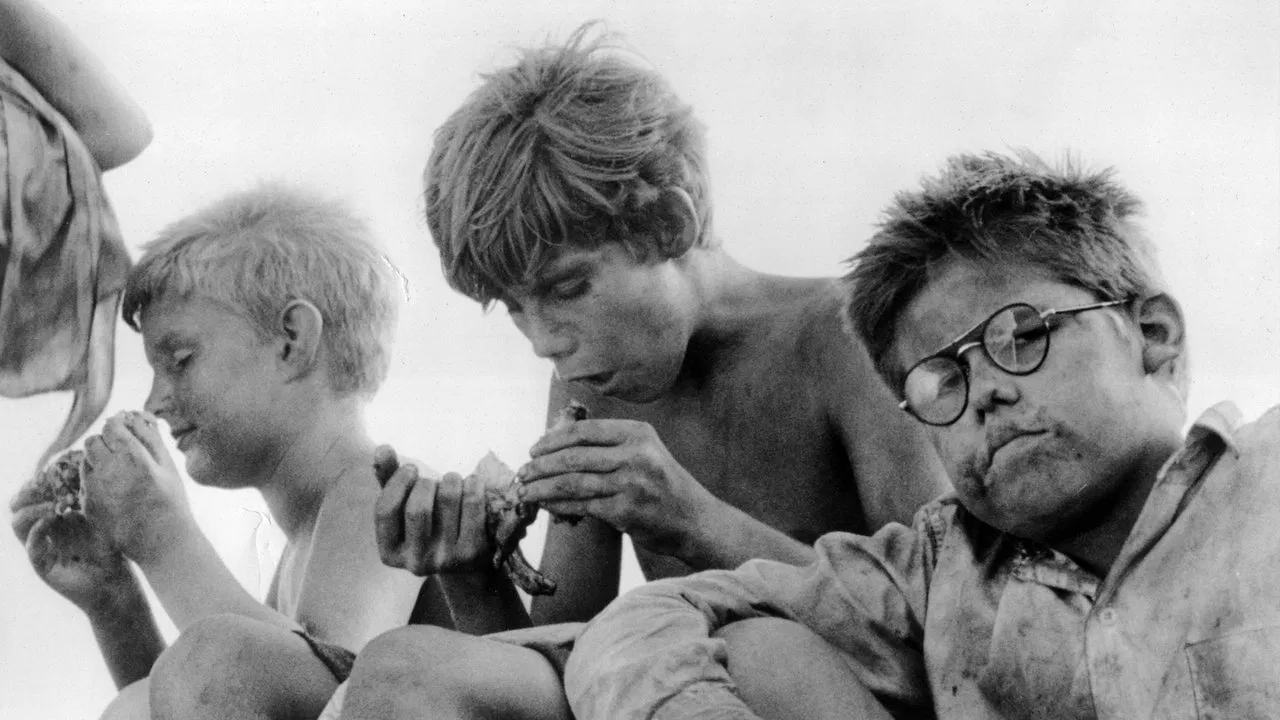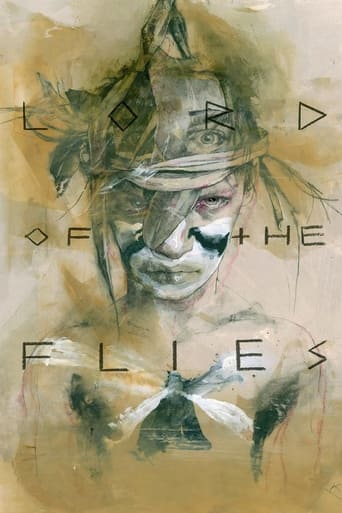

That was an excellent one.
... View Morejust watch it!
... View MoreIt's the kind of movie you'll want to see a second time with someone who hasn't seen it yet, to remember what it was like to watch it for the first time.
... View MoreThere's a more than satisfactory amount of boom-boom in the movie's trim running time.
... View MoreIt is one of my favorit novels. because it remains the fundamental map for define the childhood, the dictatorship, the demons living in us, the temptation, the cold and hot, in same mesure, cruelty. and the adaptation of Peter Brook represents the inspired one. first, for the great cinematography . second - for lovely reflection of the essence of Wiiliam Golding masterpiece. not the last, for the performances. you feel each line of novel in this film, in its original sound and flavor and tension. you discover, again, the powerful message of the novelist. his fears. and his pesimistic perspective about the evil and its "freshness" of childre. entire universe of shadows and cruelty is reflected in the art of Peter Brook. and scene by scene I remind the period of high school when I was first time front to this magnificent book . it is an useful film. and this fact is only real important thing. for see the world from the right angle. for create, like me, a solid imafe about the demons inside us. and for become sincere. about yourself. about the others.
... View More(*Most memorable movie-quote screamed in unison by a dozen warring boys*) - "Kill! Kill! Kill!" (Filmed on a budget of just $250,000) - I would never say that this 1963 film-adaptation of William Golding's novel (of the same name) was great movie-making..... But, if nothing else - Lord of the Flies certainly did make quite a powerful statement about how quickly innocent children (who are completely isolated from adults) will form their own government and, ultimately, turn to savagery and cold-blooded violence without a second thought.Filmed entirely in Puerto Rico (but its story was set on an uninhabited island in the South Pacific) - Lord of the Flies (due to its unconventional subject matter) is particularly notable for the ultra-conservative era in film-making in which it was made.Competently directed by UK film-maker, Peter Brook - The performances of the 30 boys cast in the film were all, pretty much, improvised. None of these boys were professional actors.
... View MoreShot on a low budget with tropical backdrop and an entire cast of children. There are Four standout preadolescence characters that represent different factions about life in this inverted Island society. Ralph who is by nature very practical (the protagonist)who represents order, and early in the movie is the productive leader.Jack is the antithesis of Ralph who was strong willed and an ego maniac as he already is making the majority of the young boys into warriors. As the movie wears on Jack takes off his school uniform and transforms into a cannibal savage type complete with war painted face and palm leave loin coverings. The vast majority follows suit over time which puzzle Ralph. Then there's Simon, slender and small in stature, who's dialogue is minimal at best but gives an impression of all that pure and good in the world and most importantly doesn't sway and is non-impressionable to the savagery that's brewing around the island. Finally there's our tragic figure Piggy. portly, bespectacled and colorful martyr of the story who tends to the little ones. Piggy who is teased and badgered by the group except for Simon and Ralph. Piggy's value to the young savages is his glasses which are used to start fires. Ralph quickly loses control of the children as they transform into wild like cannibals with war painted faces and spears. Some are even naked by films end. Two reasons for this is there is no adults around and secondly no hope of rescue in sight which poses many thoughts in my mind as I viewed this movie. The mystique of this picture is the unknown from past events. Why did the plane crash. How many Adults where on board? Why did this Boarding school from England travel across an ocean to this remote location? So many answered questions which is the glue that holds your imagination.You can't help yourself to continue watching this down hill spiral of this juvenile civilization, School yard style. Great performances by James Aubrey as Ralph Tom Chapin as Jack. Tom Gaman as Simon and Hugh Edwards as Piggy. Cleverly, the filmmaker's shot this movie in black and white as to not let the greenery overtake the somber and cannibalistic tone of the movie. On a spoiling note the death scenes of Piggy and Simon are heart wrenching. Film makers use music to soften the blow but not in this movie when it comes to death. When you see an innocent dead child floating in the murky water it shocking. A must see film on life's lessons that show's that human's young and old can easily fall into their inner demons.To quote Emma Cole, "...Our souls may be consumed by shadows,but that doesn't mean we have to behave as monsters."
... View MoreAfter a plane crash in the ocean, a group of British students reach an island. The boy Ralph (James Aubrey) organizes the other kids, assigning responsibilities for each one. When the rebel Jack (Tom Chapin) neglects the fire camp and they lose the chance to be seen by an airplane, the group split under the leadership of Jack. While Ralph rationalizes the survival procedures, Jack returns to the primitivism, using the fear for the unknown (in a metaphor to the religion) and hunger to control the other boys. His group starts hunting and chasing pigs, stealing the possession of Ralph's group and even killing people. When I saw the 1990 "The Lord of the Flies", I found the impressive story very scary since it shows the lost of innocence of children fighting to survive in a society without perspective and rules. My immediate association was with my and other Third World countries, where many children are abandoned by the Government in their poor communities, and without education, perspectives in life and laws, become very young criminals working in gangs of drug dealers and thieves. In this movie, it is exposed how primitive a kid can be without the authority and respect, and this sort of violence is in the headlines of our newspapers almost every day. I have never the chance of reading this visionary novel, but both movies are very similar and I believe that they are good adaptations, with a frightening study of characters and sociology. My vote is eight. Title (Brazil): "O Senhor das Moscas" ("The Lord of the Flies")
... View More